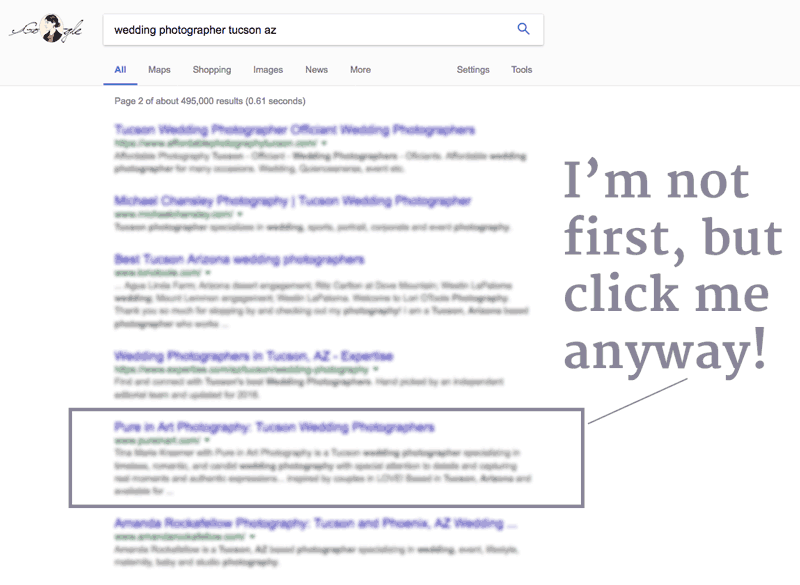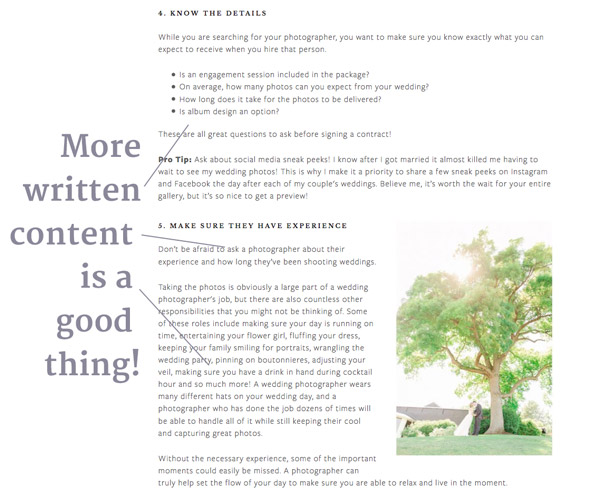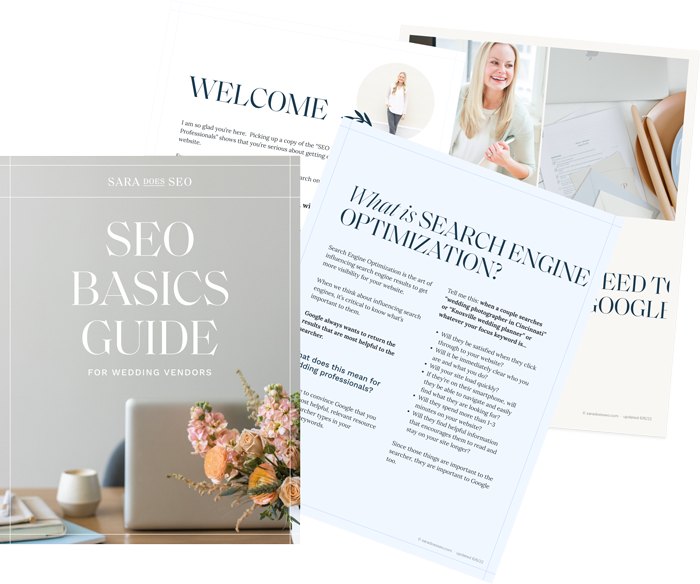
9 Ranking Factors that Influence Your SEO
Have you ever been curious why Google and other search engines rank some websites above others in search results?
It’s time to learn what they’re looking for.
Search engines want to return the most relevant and most helpful results for their searchers. To figure out who is most relevant and most helpful, there are a number of ranking factors they consider.
SEO ranking factors are the signals that search engines look for to decide which pages are best. Ranking factors help search engines understand:
- If the website has authority and trust (vs being new or spammy)
- If the website’s content is high quality
- If the website satisfies visitors who land on it
SEO resources tell us that Google’s algorithm considers over 200 ranking factors to determine search results.
Some ranking factors have more weight and are more important than others. Here, I am going to cover the ranking factors that are most important and make the biggest impact for wedding vendors.
When Google looks at your website, will they see these positive signals?
In this Post
9 SEO Ranking Factors That Influence Search Ranking for Your Wedding Industry Website
Clear (but not overbearing) keyword use
Google won’t rank your website, page, or blog post if they can’t figure out what it is about.
You want to use your focus keyword on your page. Don’t be too clever. Make sure Google (and your website visitor) immediately understands what you do. That means using the term “wedding photographer” on your Home page rather than something creative and abstract like “capturer of memories.”
I always recommend that my clients use their most important keyword clearly on their home page. It should be used in the page title, page content, meta title, and meta description for that page.
However, this does not mean you should force your most important focus keyword (i.e., “wedding photographer in Greenville, NC”) onto every page, blog post, title, and image name on your website. While that tactic may have worked years ago, it may now hurt your rankings more than it helps. Focus on your home page first.
Links to your website from other relevant industry websites

Features on online wedding blogs are great backlinks (the bigger and more authoritative the blog, the better)
A link to your website from another relevant website is like a “vote” for your website’s quality. In SEO, we call these “backlinks,” and backlinks are really important.
Building quality links is hard work and doesn’t happen quickly. That’s why Google favors pages and websites that have a lot of other websites linking to them. The assumption is: this website is good if other people are talking about it.
The other website’s authority and topic also play a role. A link to your site from a popular wedding publication is a big deal. This says to Google “If this big wedding publisher is willing to link to this photographer’s website, the photographer is likely also wedding-related and possibly a high-quality site.”
A link to your site from your friend’s travel blog is less useful.
A few quick ideas for relevant, real, high-quality backlinks:
- Publication on wedding blogs
- Links from other vendors’ blog posts for weddings you worked on
- Local directories like your Chamber of Commerce
A word of caution— Never try to game the system by buying backlinks. You need to be very careful to avoid Google penalties caused by spammy link creation, the equivalent of a “get rich quick” scheme.
Always aim to earn high-quality, real links back to your site.
User behavior
The way searchers interact with your website and your listing in search engine results is becoming increasingly important.
Google has the ability to track which listings are clicked in their results. They also monitor if a user clicks your website and then quickly clicks the back button to return to the search results and keep looking.
You want users to:
- Click on your website’s listing in search results because it looks the most interesting, even if you’re not the first result
- Visit multiple pages on your website
- Stay on your website, looking around for a few minutes (increasing time on site and pages per session)

If users in search results consistently click a listing that isn’t first, Google may move it up. So, try to make your meta title and description as interesting as possible.
Quality and length of content
Numerous studies have shown that pages and posts with longer written content tend to rank better in search. This is for a few reasons:
- More words means you likely used more synonyms and variations of your focus keyword. Search engines will understand better what your page is about.
- Longer content is often more helpful or entertaining for the visitor
- Visitors likely stay on your site longer if they have more to read
- Longer content receives more social shares and links on average (According to a study by Moz, “long form content of over 1,000 words consistently receives more shares and links than shorter form content“)
I know the tendency when posting weddings on your website is to “let the images speak for themselves.” Writing is hard if it’s not your creative medium, and sometimes you don’t know what to say. But don’t skimp on written text on your pages or blog posts. Writing more is one of the biggest ways you can differentiate your site from other vendors.
Whenever you post a wedding on your website, I highly recommend writing compelling, helpful content to go along with the images.

Write more! It helps Google to rank your page higher.
A few ideas for writing more content:
- Share the couple’s engagement story
- Talk about who the couple is and what was important to them for their wedding
- Describe the venue and the different locations used
- Show off unique details and include any information about where they were from or how they were made
- Share what made the wedding different or unique from others you’ve participated in
- Share your own favorite memory from the day or the planning process
- Ask your couple to write about their wedding for you (a post-wedding survey is great for this)
- Ask a few quick questions of the other vendors if you see them. Take notes if possible and include their quote about the flowers, the photos, the tablescape, the location, the music choice, etc.
- Include a testimonial if at all possible
Website size & number of pages
In addition to having more written content on each page, Google also tends to prefer websites that have more pages overall.
A site with 40 high-quality pages and posts is likely to rank better than a site with just 10 shallow pages. Still, you don’t want to publish weak, short content just to have the biggest site out there.
My recommendation is to publish blog posts regularly (monthly is fine) to grow your content over time, without making it too overwhelming.
Freshness of content
Search engines like to see websites and content that are newer or updated recently. Information on a newer or recently updated page is less likely to be outdated for the user, so Google gives it a boost.
This is just another reason to publish blog posts regularly. Google will see the activity as a site that is fresh and relevant.
You may also want to consider adding new weddings to your portfolio every few months and updating your bio and About page each year.
Page load speed
Other factors being equal, faster websites rank better.
This is because website users do not have the patience to wait for your site to load once they click on your search listing. They’ll bounce back to the the search results if they wait too long. We want pages to load in three seconds or less (preferably way less).
For wedding vendors, images are often the biggest culprit for slow-loading sites. Make sure your images are compressed and optimized for web before uploading to your website.
Cheap shared website hosting, badly coded themes, and technical issues can also cause slow load speed.
Social shares and activity
Social media activity is a bigger ranking factor than ever before. When your content is linked to, shared, liked, and commented on on social media, search engines learn that it is interesting to users.
When you post a new wedding to your website, share the link on Facebook (and LinkedIn and Twitter if you have them). Feel free to share it again on the couple’s anniversary or when it’s relevant.
Also, consider sharing links to your website on other social media posts when it makes sense. Something like: “These warmer temperatures are making me think of spring weddings! Here was one of my favorite spring weddings from last year: [link]”
Mobile friendliness
Search traffic on mobile devices (smartphones and tablets) is higher than ever. To make sure searchers on mobile are happy with their results, Google started giving rankings boosts to websites that are mobile friendly back in 2015.
Google recommends having a responsive website. That means your website adjusts its layout based on the size of the screen. It is not recommended to have a separate website for mobile visitors (like m.yourwebsite.com).
How often do you test how easy your website is to use on mobile? If you’re trying to drive traffic from Instagram, Facebook, and search engines, it better be.
You can test whether Google thinks your website is mobile-friendly using their Mobile-Friendly Test tool.
As I mentioned before, there are hundreds more factors that search engines consider when building search rankings. But—these are some of the most important.
As I mentioned numerous times in my post What Is Search Engine Optimization?, your number one goal should be to make your website helpful to your site visitor. Understanding ranking factors can guide you in building a better, more helpful website and help you reach rockstar status on Google.
Post last updated January 31, 2021

The SEO Basics Guide for Wedding Professionals
Get instant access to my top SEO tips, including only what's working right now.

Every creative wedding pro needs a geeky best friend. Let me help you and your work get found online.